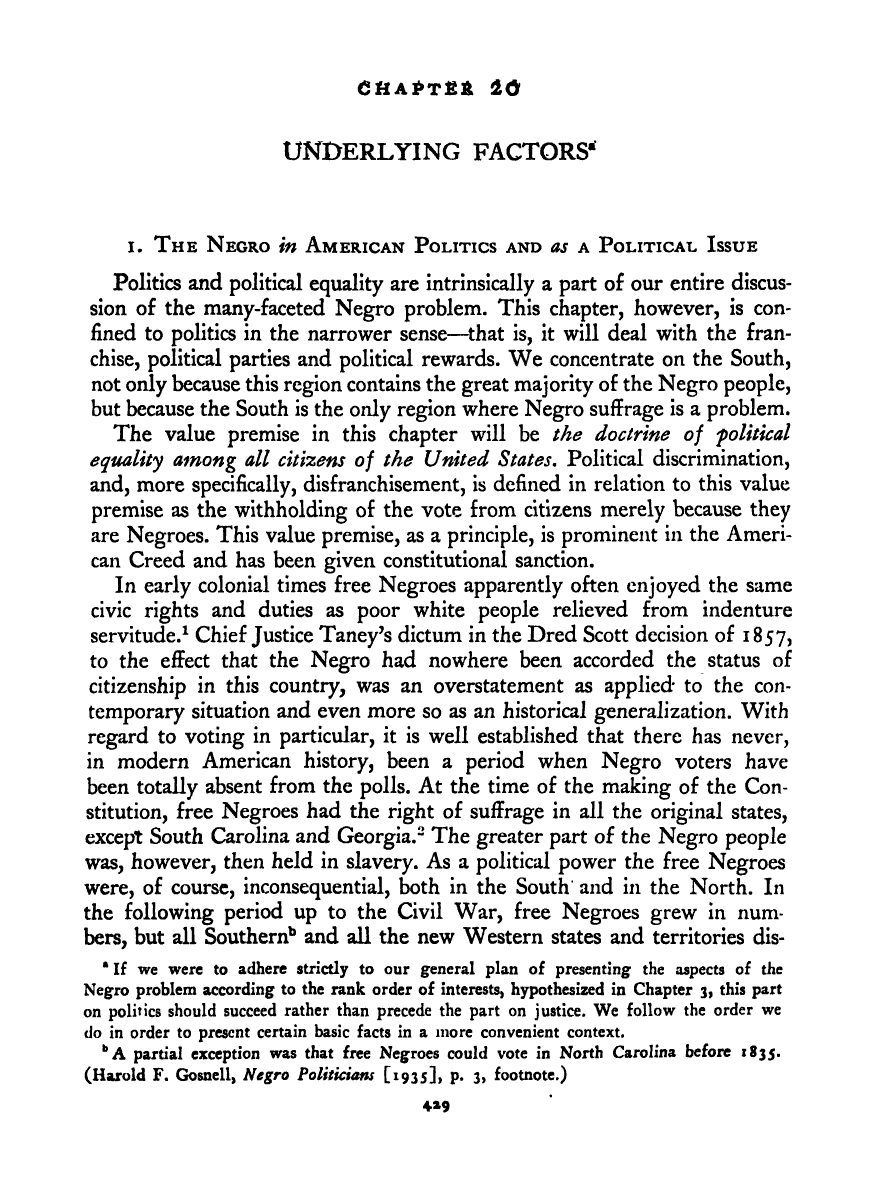Note: Gunnar Myrdal died in 1987, less than 70 years ago. Therefore, this work is protected by copyright, restricting your legal rights to reproduce it. However, you are welcome to view it on screen, as you do now. Read more about copyright.
Full resolution (TIFF) - On this page / på denna sida - V. Politics - 20. Underlying Factors - 1. The Negro in American Politics and as a Political Issue

<< prev. page << föreg. sida << >> nästa sida >> next page >>
Below is the raw OCR text
from the above scanned image.
Do you see an error? Proofread the page now!
Här nedan syns maskintolkade texten från faksimilbilden ovan.
Ser du något fel? Korrekturläs sidan nu!
This page has never been proofread. / Denna sida har aldrig korrekturlästs.
CHaPtEA iO
UNDERLYING FACTORS*
I, The Negro m American Politics and as a Political Issue
Politics and political equality are intrinsically a part of our entire discus-
sion of the many-faceted Negro problem. This chapter, however, is con-
fined to politics in the narrower sense—^that is, it will deal with the fran-
chise, political parties and political rewards. We concentrate on the South,
not only because this region contains the great majority of the Negro people,
but because the South is the only region where Negro suffrage is a problem.
The value premise in this chapter will be ^he doctrine of political
equality among all citizens of the United States, Political discrimination,
and, more specifically, disfranchisement, is defined in relation to this value
premise as the withholding of the vote from citizens merely because they
are Negroes. This value premise, as a principle, is prominent in the Ameri-
can Creed and has been given constitutional sanction.
In early colonial times free Negroes apparently often enjoyed the same
civic rights and duties as poor white people relieved from indenture
servitude.^ Chief Justice Taney^s dictum in the Dred Scott decision of 1857,
to the effect that the Negro had nowhere been accorded the status of
citizenship in this country, was an overstatement as applied to the con-
temporary situation and even more so as an historical generalization. With
regard to voting in particular, it is well established that there has never,
in modern American history, been a period when Negro voters have
been totally absent from the polls. At the time of the making of the Con-
stitution, free Negroes had the right of suffrage in all the original states,
except South Carolina and Georgia.- The greater part of the Negro people
was, however, then held in slavery. As a political power the free Negroes
were, of course, inconsequential, both in the South and in the North. In
the following period up to the Civil War, free Negroes grew in num-
bers, but all Southern^ and all the new Western states and territories dis-
* If we were to adhere strictly to our general plan of presenting the aspects of the
Negro problem according to the rank order of interests, hypothesized in Chapter 3, this part
on politics should succeed rather than precede the part on justice. We follow the order we
do in order to present certain basic facts in a more convenient context.
partial exception was that free Negroes could vote in North Carolina before 1835.
(Harold F. Gosnell, Negro Politicians [1935], p. 3, footnote.)
4»9
<< prev. page << föreg. sida << >> nästa sida >> next page >>